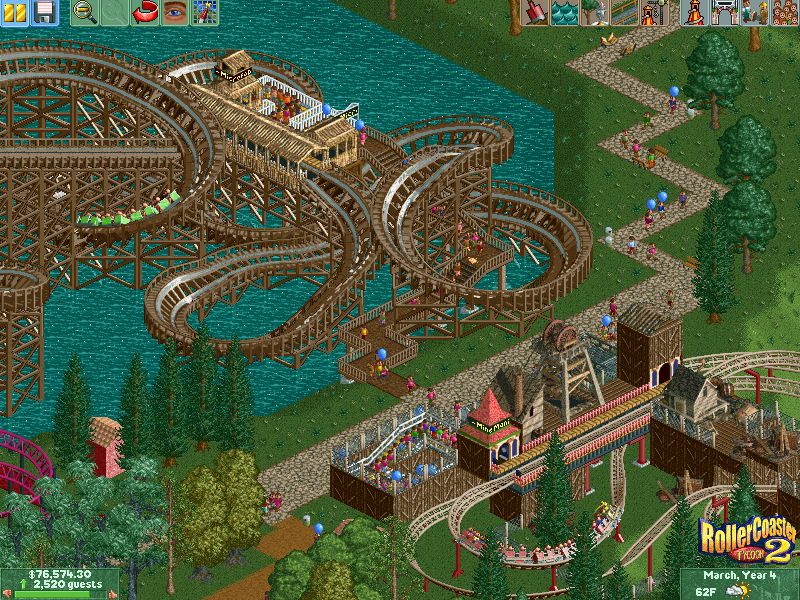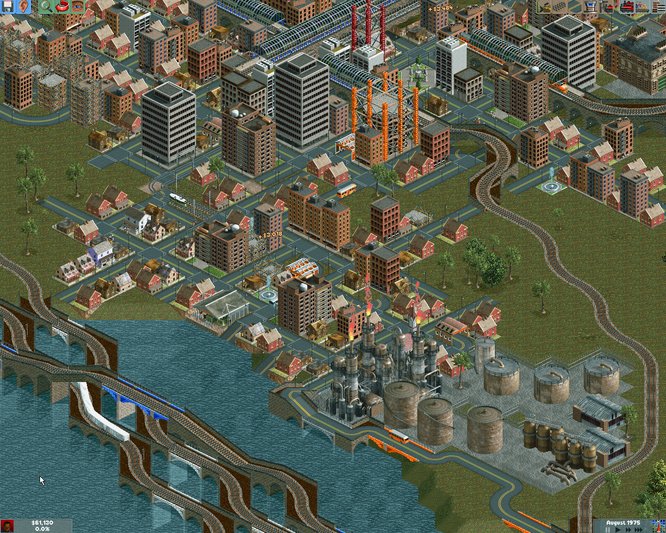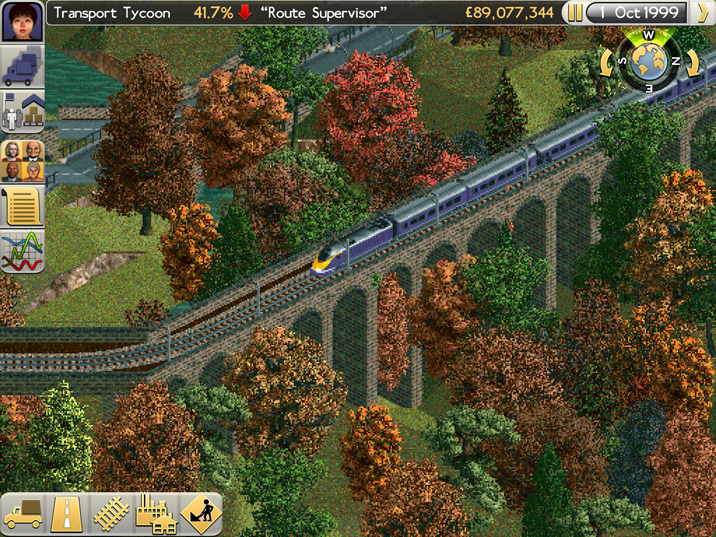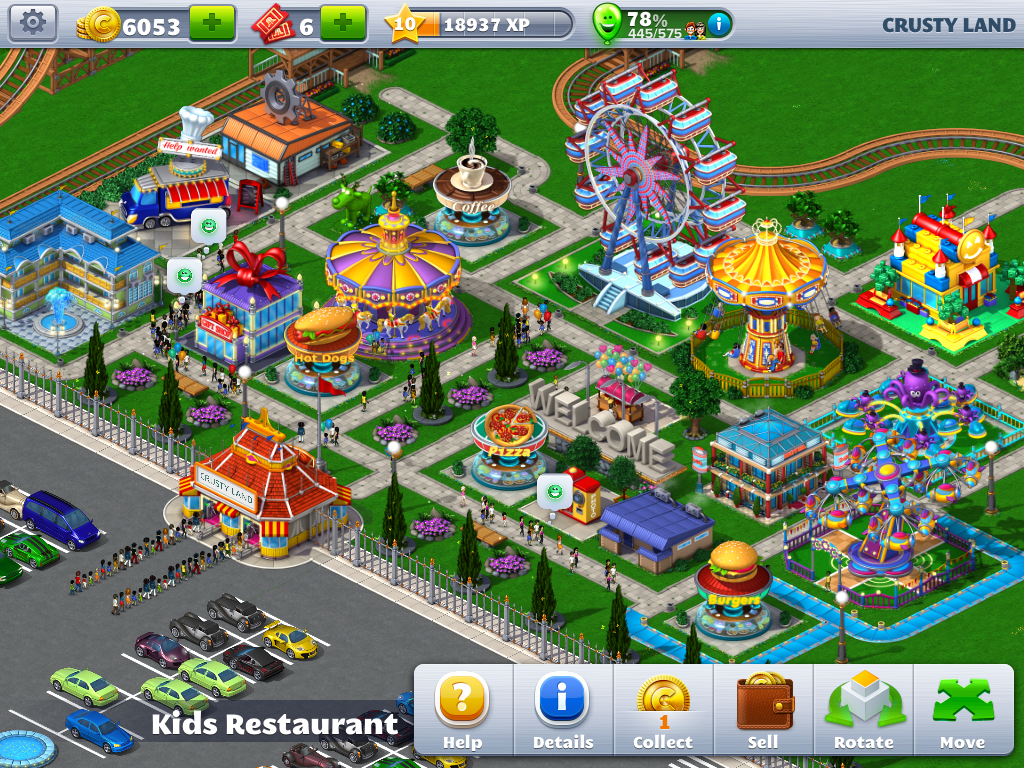20 years of RollerCoaster Tycoon: an interview with the creator of the game
- Transfer

On March 31, 1999, RollerCoaster Tycoon was released, completely created by one person and written in x86 assembly language. In honor of the anniversary of the game, we publish a translation of the interview with the author, recorded in 2016.
Today, few remember the name of Scottish programmer and video game designer Chris Sawyer. It seems that the inventor of RollerCoaster Tycoon gladly allowed Atari to create new games in his beloved series of strategies, and he himself began to deal with more important things for him now. Nevertheless, despite the radio silence, Sawyer's games are still remembered and revered by many more than 20 years ago.
While playing games such as Elite Plus, Frontier Elite 2, Birds of Prey and Dino Dini's Goal from Amiga to PC in the early 90s, Sawyer created his first leader simulator called Transport Tycoon. He wanted to develop the ideas of Sid Meier's Railroad Tycoon, combining its gameplay elements with his isometric graphics code, and create a new type of map. MicroProse approved Transport Tycoon, released it in 1994, and the game became a hit. Its extended and improved version of Transport Tycoon Deluxe was released just a year later.
While planning the sequel to Transport Tycoon, Sawyer fell in love with roller coasters. And so his next project turned into a RollerCoaster Tycoon game, released in 1999. She also became a hit. She was followed in 2002 by RollerCoaster Tycoon 2. She became an even bigger hit. Despite partnering with publishers such as Hasbro, Sawyer retained ownership of the RollerCoaster Tycoon franchise, and it appears to have been worth the effort due to success.
Subsequently, Sawyer decided to let go of the development of the RollerCoaster Tycoon and let others control the trolley. Launched in 2004, RollerCoaster Tycoon 3 was developed by Elite: Dangerous, Frontier. In the same year, Sawyer released Locomotion, which he called Transport Tycoon's spiritual successor.
And then ... everything was quiet. Sawyer disappeared from the radar screens for a dozen years, appearing only in 2013 for the release of the mobile version of Transport Tycoon along with a small Origin8 development team. What about the RollerCoaster Tycoon? Atari, once involved in a lawsuit with Sawyer due to outstanding royalties, is currently licensing RollerCoaster Tycoon with him to create new games in the series. But for now, these games are getting bad reviews.
Atari’s RollerCoaster Tycoon 4 Mobile was a microtransaction-frustrated disappointment. She was so bad that in our review we rated her 1/10. And the RollerCoaster Tycoon World, which is in operation, suffers from development problems: people speak negatively about its quality , there are delays , and a new game studio has set about creating it.
All this happens while Frontier is working on Planet Coaster, a promising amusement park management simulator that many RollerCoaster Tycoon fans have hoped for.
Therefore, it seems to me that today it will be interesting to conduct an interview with Chris Sawyer. What is happening right now? How involved is it in development, and is it involved at all? Why do his games, many years after the release, continue to delight so much? What does Atari do with RollerCoaster Tycoon, in his opinion?
In preparation for the interview, Sawyer said he was “a very reserved person.” Yes, he gives interviews, but prefers to answer questions by e-mail. I usually don’t conduct interviews through the mail, but it turned out that this is the only option, so I agreed.
And here is the result: a conversation with the creator of RollerCoaster Tycoon Chris Sawyer about almost everything else.

Chris Sawyer.
Thank you for agreeing to answer our questions. First of all, I’m wondering what are you working on right now?
Chris Sawyer: Now my favorite project is to transfer the old PC RollerCoaster Tycoon 2 game to modern mobile devices and tablets. This is not an easy task, given that the original game was written in low-level x86 assembler code that only runs on PC. But thanks to the success of Transport Tycoon on mobile platforms and with the experience and willingness of a small Origin8 development team, it seems quite achievable to me. Therefore, now we are working with them to create a very accurate copy of the original PC game.
I believe that more modern versions of RollerCoaster Tycoon have slightly changed the style and gameplay, and therefore now the market has a demand for the original "classic" version of the game with its unique graphic style and simpler gameplay. The success of Transport Tycoon has shown us how the touchscreen interface of mobile phones and tablets fits the style of the game. For me personally, this is a very exciting project and I really look forward to its completion and publication.
What does your ordinary day look like?
Chris Sawyer:in very different ways. Now I spend quite a lot of time daily with the Origin8 team. They try to figure out my old RollerCoaster Tycoon 2 source code files, but I only participate if necessary. On such days, I am more engaged in personal life, volunteer work and hobbies (including roller coasters - I already have 657 different attractions on my account!) I hope I will never have to return to the time when I worked 16 hours a day and seven days a week, even though I liked every minute.
You mentioned volunteer community service. Can you tell us more?
Chris Sawyer: among other things, I go to local elementary schools once a week and help them work with the media. This is very exciting and I learn from children almost as much as they do with me.
Which roller coaster will be next on your list?
Chris Sawyer: I have already seen so many attractions that now only something really outstanding can surprise me. I like the look of Taron, which is currently being built in the German Phantasialand. Many winding paths are concentrated on a very small area and complemented by thematic cliffs and surroundings. When they are finished, I will definitely add them to my list.
I’m also interested in new roller coasters called Wildfire, being built in Swedish Colmorden.

“I still like this game and everything related to it,” - Chris Sawyer about RollerCoaster Tycoon 2.
Perhaps you are best known for creating the Tycoon series of games. Looking back at all the work you have done, what game are you most proud of and why?
Chris Sawyer:in terms of success and game design, this is without a doubt RollerCoaster Tycoon 2. I still like this game and everything related to it. It is amazing to realize that over the years, so many people have played it. However, as a programmer, I am most proud of Chris Sawyer's Locomotion, because I believe that this is the best program code of all that I wrote. It is much more complicated than RollerCoaster Tycoon, but the code was much better structured, and I really enjoyed writing the AI code of competing companies, the data system of the plug-ins (which is now supported by a large online community of fans) and creating a reliable network multiplayer system.
Is there any design philosophy behind all your games?
Chris Sawyer:when writing games, I never had a design philosophy, I just worked on those ideas that I am interested in at the moment. But looking back today, I think my games have a philosophy similar to Lego. These are games in which the player builds the structures block by block in a fairly simple and limited environment, and then interacts with these models, trying to get them to work correctly, improving and rebuilding individual elements if necessary, receiving rewards for their construction and management skills.
Perhaps this Lego-style philosophy explains why I let Frontier and Atari take on the task of creating RollerCoaster Tycoon 3 and further games? I understood that the logical way to develop the game is to add new details, use a three-dimensional camera and remove the limitations of block construction. But for some reason, I didn’t really like the idea of such a development, so it was right to convey the game to those who happily set about its further movement.
You have been part of the gaming industry for over 30 years. What, in your opinion, the most important changes you observed?
Chris Sawyer:in terms of development, a major change was the increase in the size and scale of development teams; we moved from the stage of lone developers of the past to large teams consisting of programmers, artists, screenwriters and producers. The disadvantage of large teams is the huge cost. No one wants to risk such a huge cost, developing an original (i.e. risky) game, so although the games are becoming more and more, there is no variety in them.
In a sense, we made a full circle, because now it is very easy to create simple mobile games with small budgets and tiny teams, but this often causes problems due to another major change in the game industry: making mobile games is so simple, that now there are a lot of them and making money on them is quite difficult. The traditional model with buying games rarely works on mobile platforms, because players tend to play free games, and using other methods of generating income within the game, such as advertising or in-game purchases, can annoy or interfere with the gameplay.
Personally, I am disgusted with all the games that deliberately try to hook the player and convince him that in order to continue or simplify the game he needs to pay, but such a system has proven successful.
Are you playing anything now? Do you play modern games? Do you like any specific genres or developers?
Chris Sawyer:Honestly, I rarely play now. The world of games has gone ahead, but I have stayed where I am and I miss the imperfect style and awkward simplicity of games created 20 years ago. I admire the amazing graphics, the huge size and realism of many modern games, but for some reason they do not cause me enthusiasm. Perhaps they are too realistic? I don’t know, but too much realism in games does not appeal to me. I am subscribed to the only gaming magazine: Retro Gamer!
You own the copyright and trademark of RollerCoaster Tycoon. I understand that when it comes to financing and distribution through the publisher, it is very difficult for developers to maintain rights to their games. How did you manage to first retain the rights to RCT, and then keep them for so long?
Chris Sawyer:in the late 90s, I created the first RollerCoaster Tycoon game completely on my own, so it was almost ready when no publisher had seen it yet. This probably simplified the maintenance of rights, and there is no doubt that this was my game, it was not funded or initiated by the publisher.
I was also lucky that the negotiations on the publication were conducted by my business agent Jackie Lyons from Marjacq, who always stubbornly defended the preservation of the maximum rights of her clients, and not just “sold” it. I have no doubt that without her many years of care and perseverance, I would not have had such fame, and the games were not so successful.
It is also possible that the selected publisher (Hasbro Interactive) at that time did not realize the potential long-term value of the franchise, as indeed all of us - it seemed like a risky game with a niche audience that would have difficulties in the market.

Sawyer's last original game was Locmotion, released in 2004.
It seems that after the release of Locomotion in 2004, you moved a little away from the gaming industry. Why? And what did you do between the release and foundation of 31X Ltd in 2010?
Chris Sawyer: By the end of 2004, he had lived, breathed and worked only on games for 20 years. It is time to change priorities, take a break, reduce the load and put more time and effort into personal life and other interests, and not just spend 16 hours a day sitting in front of a computer. In addition, I felt that I had achieved what I wanted, and I did not have enough inspiration either to develop old ones or to create new games.
Especially I was averted by the tendency to increase cruelty and destructiveness in games. The gaming industry was moving forward, games were getting bigger and more complicated, and I just didn't have the enthusiasm for creating games of this type or for working in a large team developing such games. It was also aggravated by the Atari lawsuit regarding royalties. It took several years to work with lawyers and expenses before we reached an agreement, which ruined my attitude to the industry as a whole.
I read that you are called a "crazy genius." How would you describe yourself?
Chris Sawyer: perhaps with the “crazy” I would agree! I’m not sure how I could call myself - probably as petty, purposeful, obsessed with details, sometimes stubborn, often persistent and usually not serious.
They told me that you are a "very reserved person." You rarely interact with the press and fans. Why?
Chris Sawyer: in the mid-90s I was very socially active, communicating with players and fans on the Internet, but after the success of Transport Tycoon it began to bore me and in the end became an obstacle to what I want to do - to create games with complete freedom . This not only took too much time, but also prevented me from focusing on what is best for my games - everyone has their own unique opinion about how games should work and what functions they should have.
It would be too simple to create a “society-developed” game, so blurry that it loses its character and turns into a bunch of unrelated functions. Therefore, from now on I limited my communication and simply started to create my own vision of the game I’m working on, even if it meant that there would be flaws in it. At least she will retain her character and she will stand out and have a holistic design. I never stopped reading fan forums and have a lot of respect for fans and their views, but rarely personally participate in discussions.
As for the press, for many years I participated in many interviews and rarely refused them, but I didn’t like self-promotion, and I don’t think I can justify the image of the mythical character that the online community sometimes considers me to be. I think that since the first Transport Tycoon, and especially after the success of RollerCoaster Tycoon, games have outgrown me and I give them the opportunity to speak on their own.
Your games have incredibly influenced a whole generation of game developers, and are still loved by a dedicated army of gamers. Why do your games stay attractive for so long?
Chris Sawyer:probably a combination of several factors. These are very positive games dedicated to construction, proper design, management and "cultivation", they allow players to "create" and I believe that they have an individual "character" in terms of appearance and sensations.

Sawyer reappeared on stage in 2013 with the release of the mobile version of Transport Tycoon.
In 2013, ten years after being suspended from game development, you released Transport Tycoon on mobile devices. What caused your return? How did the game work?
Chris Sawyer:The driving force behind this project was my business agent, Jackie Lyons. She was able to anticipate that Transport Tycoon is capable of matching modern touchscreen mobile devices and together we founded 31X Ltd to create new versions of Transport Tycoon. At first, we had several false starts, mainly caused by the difficulties of transferring the old source code in x86 assembler and my unwillingness to simplify or limit the original game, but in the end we created a complete game that looked very good and played on touch screen devices.
The sales of the game were decent, and it continues to be sold even after a few years, and the reviews are mostly very positive.
You have a long working relationship with Atari, which has its pros and cons. How could you describe this relationship?
Chris Sawyer: yes, our relationship itself resembled a roller coaster! I am not angry with them and I think that we all have learned from the past, and now our relations with Atari are built on a healthy basis.
Atari has a subsidiary called RCTO Productions, LLC, which manages the RollerCoaster Tycoon games. I understand that you own the brand, but how can you explain the ownership of the series with respect to Atari? What exactly does she control?
Chris Sawyer: I own the intellectual property rights and trademarks of RollerCoaster Tycoon, and the rights to create and market new RollerCoaster Tycoon games are licensed by Atari Interactive.
How does this relationship work? When Atari licenses your RollerCoaster Tycoon trademark for a new game, do you have the right words in quality control?
Chris Sawyer: I hardly interfere in the creation of new Atari games. I never wanted to participate in the development of design and games, and given the value of the franchise for Atari, I can expect that their own quality control department will ensure the quality of the finished product.
You said you prefer not to interfere with the new Atari games in the RCT series. Why?
Chris Sawyer:I think you need to understand that my personal vision of RollerCoaster Tycoon was completed with the latest version of the game that I created myself, namely RollerCoaster Tycoon 2, and I'm no longer interested in working on someone else's vision of future versions of the game. It is better to allow those who have inspiration to realize their own vision in the new version of the game and not interfere.
RollerCoaster Tycoon has come a long way after RCT1 and RCT2, and although I am curious to observe how new games evolve and evolve, I am not the right person to direct or limit the design and development of games that are so different from mine.

RollerCoaster Tycoon 4 Mobile has disappointed many fans of previous RollerCoaster Tycoon games, but proved financially successful for Atari .
What do you think of the RollerCoaster Tycoon 4 Mobile? Have you ever participated in its development?
Chris Sawyer: Atari had complete freedom in the development and marketing of RCT4Mobile - except that I saw several assemblies during the development process, I did not participate in this at all. I know that there has been much debate about the marketing model and design of the game, but there is no doubt that the game was a success for Atari.
How did you contribute to the development of the RollerCoaster Tycoon World Atari? Have you worked to some extent with developers?
Chris Sawyer:From time to time I heard developers reviews and saw several assemblies, but otherwise I completely pulled back. This is Atari's own project and I have nothing to do with design or development.
We have heard many times that the RollerCoaster Tycoon World is having problems. How do you look at Atari product quality and leadership?
Chris Sawyer: in a way, I’m not surprised that the development was so problematic - they aimed at a very big game with high ambitions, and I know how complicated even RollerCoaster Tycoon 1 and 2 were. I think it's good that Atari realized that everything is going wrong, and was ready to postpone the release of the game and return to the beginning with a new team. I hope they succeed in completing the game and achieve all ambitious goals.
Are you worried that Atari will damage the RollerCoaster Tycoon 4 Mobile and RollerCoaster Tycoon World with the reputation of your series of games and brand?
Chris Sawyer: to some extent, I have to trust them in creating a positive image of the RollerCoaster Tycoon franchise. They know what they are doing, and they certainly do not want to devalue such an important part of their portfolio of gaming franchises.
You say you trust Atari to build the RCT franchise correctly, and I think your fans hope so too, but many of the company's latest games have disappointed. At least, for example, the recent Atari shooter, which has been unplayable for five months. Is it likely that Atari will create such a bad RCT game that you revoke the license? Is it possible that you want to do this?
Chris Sawyer: Atari has a limited license, so it is in their own interest to ensure the high quality of the new RollerCoaster Tycoon games to build a franchise for the future, and I am sure that they will ensure the long-term success of their games.
Atari’s RollerCoaster Tycoon World release has been delayed several times, and the game has changed the developer. But can she finally get back on track?
Do you have a working relationship with Frontier Developments? Have you been involved in creating the RollerCoaster Tycoon 3 mobile port?
Chris Sawyer: I was a consultant during the development of RollerCoaster Tycoon 3 for PC in 2003-2004, but did not participate in the recent porting of the game.
Frontier Developments is working on Planet Coaster, which many consider RollerCoaster Tycoon's spiritual successor. Have you ever thought about selling a license to the Frontier RollerCoaster Tycoon brand and working together on a new game in the series? I think fans of your games would be delighted with such a perspective!
Chris Sawyer:The rights to develop new RollerCoaster Tycoon games have been licensed by Atari for many years, so now it depends on Atari whether they want to sublicense these rights to Frontier Developments or use Frontier to develop a new game, so I cannot answer this question.
How would you describe your relationship with David Braben?
Chris Sawyer: I think I first met David in 1988 when I was working on porting his game “Zarch” (published on the PC called “Virus”) to PC, and since then we have been in relationship and from time to time crossed, not in the last turn, because Frontier created extensions for RollerCoaster Tycoon 2 and was planning to develop RollerCoaster Tycoon 3.
I love David’s ambitious aspirations for the Elite series and his unquenchable enthusiasm for games in general, as well as the way he turned his game programmer career into a large and very successful company with a large team and resources that could lead his projects to results.
What are your future plans? Are you thinking of creating a new game?
Chris Sawyer: At the moment, my plans do not extend beyond completing RollerCoaster Tycoon 2 and publishing on mobile platforms. Therefore, while I have no idea. I will never categorically reject the idea of creating a new original game, but the likelihood of this is small. I think I'm getting old, and I want something simpler!
